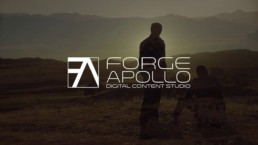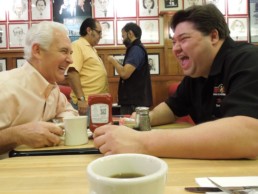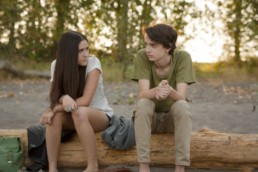Review: 'The Salt of the Earth'
"The Salt of the Earth" refers to the person or group of persons that best represent a larger part of humanity. Renowned photographer Sebastiáo Salgado knows a thing or two about these types of people, having traveled to the ends of the Earth to photograph globally removed peoples of all cultures, all experiencing unique walks of life outside of mainstream, civilized living.
It would all be so beautiful, if the centuries-spanning images he captured weren't so tragic in their harrowing truths, of these peoples' oppressive, devastating lives.
From film directors and photographers Wim Wenders and Salgado's son Juliano Ribeiro, The Salt of the Earth is both a biography of a masterful humanist photographer and look at the artist's life work, who provides commentary for his career's collection of heartbreaking photographs that arrest the viewer in its universal and emotional magnificence.
The Salt of the Earth mixes beautiful stills with narrative commentary (in French, with English subtitles) of an interviewed Sebastian, as well as footage taken by Juliano from his last photographic travel in the jungles of Africa. The film bursts with colors in the wild jungle, but is predominantly an experience of black and white still-image brilliance of previous exhibitions' stark, confronting images.
Audiences going into this film should prepare themselves for a meditative watch; the best experience will be for the viewer to give themselves completely over to this viewing experience so as to allow the power and message to move them.
The celebrated Salgado's youth and early adulthood begins the film, showing his early life, marrying his wife and collaborator, Lélia Wanick Salgado, and birthing a son, before pursuing a life of travel and photography, leading his fascinations and curiosities across continents to which we next see his career's work. While the thought of watching a mere slideshow may deter some viewers, the images themselves are not home movie quality. Audiences going into this film should prepare themselves for a meditative watch; the best experience will be for the viewer to give themselves completely over to this viewing experience so as to allow the power and message to move them.
Salgado, a humanist photographer, found his subject in his career, in the cultures of people and an ever-changing humanity. These people were all either tribes, native of the land outside of civilized society, or pursuant to oppressive hardship, surviving disastrous health, political, and violent forces that show humanity's collapse in morality.
At a solid 109 minutes long, the film shows each of Salgado's major photo exhibitions, mostly showing the farthest outreach of the industrialized world. Salgado talks about and shows his work, from which he captured on the most intimate, personal, and incredible of risks. Staying with people while documenting international conflicts, starvation, and exodus, there is enough shock and awe in each image that it is almost painful to watch. Yet this is the overwhelming power of the film, in showing the unsettling and jarring reality that exists and affects the rest of the human race.
It's no surprise then, to finally hear Salgado talk of humanity with disgust, and distaste, of which the film and his work ring out cynically with.
It's also no surprise, then, to see the photographer move to another area of study to explore–that of nature itself. The end of the film shows Salgado's work moving to that of beautiful landscapes, along with recently re-grown jungles of Brazil that his family single-handedly begun farming again. After witnessing such atrocities and horrors throughout one's life, there is a quiet understanding that would lead any person to understand moving away from humans altogether.
Official selections of the 2014 Cannes and Telluride Film Festivals, as well as last year's Academy Award nominee for Best Documentary Feature, The Salt of the Earth is an incredible entry into humanitarian efforts and awareness, as well as an artistic celebration of Salgado and his life's uncompromising achievements. While the film will require a certain dutiful discipline to endure, the film will show that, while life and its people are far from pretty, the human spirit that is realized in light of that, can be a stunning sort of beautiful.
The Salt of the Earth is in theaters this Friday.
https://www.youtube.com/watch?v=jMb7eWaBVvQ
Review: 'Danny Collins'
Why does Al Pacino need redemption?
After starring as a drug-addled thespian of the theater at the end of his artistic rope in January’s Philip Roth adaptation, The Humbling, Pacino returns to the land of spaced-out celebrity in need of an ego adjustment in Danny Collins–the sunnier, happier, late-in-life comedy version of the former that’s all contrived, hot air strutting.
The movie, about an aged yet still kicking’ rock star who, upon receiving a decades-long delayed letter from John Lennon to the younger pop crooner about following his artistic ambitions, and subsequently stepping out of the spotlight, is all groans. It's the kind of movie that fills Pacino "the actor's" ego twice-over with its gymnastic pandering, while attempting to deliver something that rings with emotional substance. Fortunately its feel-good nature never stalls out completely with its talented accompaniment of actors as their bubbly best, leaving charisma to spare throughout.
The movie's first title card disclaimer prepares the audience for its uncommitted seriousness and fun times ahead, reading: "The following is based on a true story, a little bit." So the part about a rockstar receiving a letter from Lennon having lived the remainder of his unfulfilled life in the lap of luxury is true; the rest is simply dressed up showboating, and about as much as you can handle.
The film opens in 1971, when a younger Collins is being interviewed by a Rolling Stone reporter (Nick Offerman) about his hit first album. Young Collins' meek and unsure demeanor shows that his earliest self was founded on a center of artistic striving–so when we cut to forty years later, a more salt-than-peppered Collins, adorned in half-buttoned silk shirts and Keith Richards-esque scarves, sitting lost and loaded after another hit show at the Greek Theater, yet looking forlorn in existential pity, is supposed to come off as validating to his life's current state.
It is indeed a sad thing when a rockstar can't churn out the hits for which they became so famous for, or reinvent themselves into a person with anything new to say or prove.
This leads to a lackluster surprise party that leads to his manager and long time pal Frank Grubman (a very enjoyable Christopher Plummer) gifting Collins with Lennon's 30 year old handwritten letter, who sizes up the party and his life one last time before leaving it all behind to live in a New Jersey hotel off the interstate. He gravitates towards soulful songwriting at a grand piano in his room, and also kind of just slums it with the hotel employees, while trying to reconnect with his never-met son, who's daughter has ADHD and who himself is dying from cancer. The film cycles through these peripheral matters at hand with the same self-serving toying–Collins' charming the hotel's manager (Annette Bening), plunking away at notes and lyrics to a new somber yet honest ballad, to taking his granddaughter and family to a new specialized private school, and his son Tom (Bobby Cannavale) to a doctor's appointment.
It's not that Pacino as Collins is bad in an aggressively distasteful way. He actually slips into his oh-so-charming celebrity with the most comfortable ease, letting his charisma drive the engine of the movie ever-forward. But when the film round out to featuring Collins' sulks and sofa-slumping for emotional turns, the result is too hammy. There's no rock bottom here, or spiritual bottom even, as it just trades between Collins enjoying his cultural worship and tour bus and other moments where he’s a little more down on his time, resulting in superficial blandness that leaves us eye-rolling a few times too many.
These self-pitying moments are supposed to make us feel sorry for him in his newly set upon career when his now middle-aged audience wants to hear his hit songs from yesteryear, to which the performer finds disappointed acceptance. It is indeed a sad thing when a rockstar can't churn out the hits for which they became so famous for, or reinvent themselves into a person with anything new to say or prove.
'Danny Collins' opens in Los Angeles today.
https://www.youtube.com/watch?v=AndERTFMYd4
Review: 'Seymour: An Introduction'
Young hands hover over the tiniest gap of air above the weighted keys of a grand piano; softly, a fine, classical piece takes audible shape to fill a silent and small New York University theater space, where Conservatory students and Professionals alike are present for this Master class. The heartrending romance in the music is lovely, entirely beautiful, and is stopped.
Seymour Bernstein has a note for his student.
Where today's success-driven culture is measured in madness-driven metrics for total perfection, where new-age Tiger Mom whiplash-parenting is accompanied with seeing the big-screen wallopings laden out by the likes of J.K. Simmons' salivating drill sergeant of a music teacher in Whiplash, Seymour Bernstein offers a different sort of strive for perfection–a spiritual one.
It's this distinctness that separates himself from other teachers, musicians, and really, the new American society altogether. It's this distinctness that inspired actor Ethan Hawke enough to direct a feature-length documentary (also the actor's first attempt at directing a feature-length documentary), acknowledging, "I never set out to make a documentary. I met Seymour Bernstein at a dinner party and found myself completely hypnotized...There are profound lessons inside Seymour's piano teachings that are relevant to how we approach our daily lives. His simplicty has much to offer." Founded by a consuming sort of curiosity over this man's life and mind, in the aptly titled, Seymour: An Introduction.
Of course, Bernstein himself was once an internationally acclaimed concert pianist prodigy, a handful of onscreen news clippings and reels circa 1930 and '40 are enough to educate the common viewer who might not be as verse with their classical music history. A broad-stroked biography of the musician's career might be enough for a kind of documentary, or at least one day's worth of syllabus in Music History 101, but beyond his wondrous talents as a preeminent musician, Bernstein spins his intrigue and mythos further to our head-cocked confusion, as we learn that he retired from concerts, effectively, as a public performer altogether, and at the height of his career.
Like all things, such as stopping the beautiful music on this day's class to make this singular note to his student, he did it quietly, gracefully; humbly, but purposefully.
It's a reverential homage of a movie to Hawke's existential questioning, and whose every scene provides more clarity into the insight that either the answer is plainly obvious or that there is no real question there to ask at all.
What sort of event would have to happen, then, for a renowned pianist to retire at the ripe old age of 50? What self-tortured anguish must he have experienced to give up what would be assumed to be his life's calling, the thing that one would think all serious musicians aspire to get to and hang on for dear life when you get there? For Seymour Bernstein, he merely decided that he would give up performing to teach his students and himself about music, happiness and the power of detaching satisfaction from success.
It's as simple as that.
It's this fascination, beyond artistic and more personal, that drove Hawke to make this film, to shine the light this way. We see a couple of moments in the film where he accompanies Seymour in frame to express his insecurities about his own artistic struggles, all but asking him to answer what is the meaning of life (but for a thespian, asking what personal fulfillment is by way of creating art is practically asking the same thing). It's a reverential homage of a movie to Hawke's existential questioning, and whose every scene provides more clarity into the insight that either the answer is plainly obvious or that there is no real question to ask at all.
We see all angles of Seymour's life; mostly capturing the sophisticate in his New York single bedroom apartment of nearly all his adult life, dim lights illuminating old pink-painted walls and the collection of knick-knacks over everything, where he conducts personal and private lessons with young students. He also makes his tea and folds out his bedroom's couch into his bed when he is ready to sleep. When interviewed, Seymour talks into the camera when remembering his musical past, his time spent in Europe during the War, crying when he remembers the thought of lifeless, scattered bodies. Instruments with no music to come out.
This singularly charming man, displaced in this hustling and bustling express lane-living of a culture, proves so fascinating to watch throughout the film's hour and a half minute run time, because he's clearly tuned sharper to the intrinsics of living life itself than are the rest of us. Tuned sharper to the emotional importance and component of the musician's work for which his legend is revered–a lesson that not only hitting the piano's keys, but the practice of tuning the mind to illicit the honest emotions of the heart and its song, being perhaps the most important type of mastering. This, then, is expressed in the physical transference of weight and pressure to hit the piano's pockets to play the notes just so, expressing the song's truest emotional essence.
Seymour, who would sound wizardly if not for the feeling that his always cheery voice could giggle into youthful exuberance at any moment, tells his young apprentice this as the rest of this Master class listens just as intently on–that these notes on the charts are not just notes to be played, but felt. He's strange for noticing this abstract insight, and only strange because it's so singularly obvious that he is in fact, correct.
Seymour has his student begin again, at the song's introduction. An introduction, like all things, should be truthful, and played just right.
'Seymour: An Introduction' opens in Los Angeles at The Landmark this Friday.
https://www.youtube.com/watch?v=dhtIcP6AdHo
AMBIENT
We live in a great time, where the future knows no bounds. On one hand, this modern age, with its incredible technological advances, could, in fact, lead to a dystopian downfall, birthing self-aware sentinels with runaway artificial intelligence that would then threaten all of human existence as we know it.
On the other hand, these technological advances, more realistically appropriated, offer us the means and resources of connecting with people on the internet, reaching wide audiences to showcase new and exciting short films from artists and filmmakers with cinematic-level excellence about, well...self-aware sentinels with runaway artificial intelligence that would then threaten human existence as we know it.
In this day and age, where the distribution landscape has all but exploded, having fragmented off into endless channels that let the consumer decide where to spend their viewing energy, it can be said that the internet has truly democratized entertainment itself, giving the people an unmatched power over their tools for such control.
However, being in control of your tools isn't the case or story in the new digital series, Ambient, an originally scripted sci-fi episodic story about a self-aware computer virus that pushes mankind to the brink of extinction.
Ambient is a total of five episodes, ranging from five and a half to ten minutes each totaling the better part of a half-hour to watch in its entirety. They are an easy continuous watch, all to the great fun and entertainment of its story. Just hit the Auto-continuous play, sit back, and transport yourself to a world of true sci-fi invention, and impressive independent film-making vision. Written by Rob Kotecki and Gabe Michael (producer, Epic Rap Battles of History), and directed by Michael, the series is a full story, with no shortage of visual impress and great locations. While it may track along the more familiar notes of what we've seen of popular apocalyptic sci-fi survival, the story is fresh and certainly ambitious in scope. These guys know how to build tension through a combination of intriguingly laid out story and impressive sound design to achieve its fascinating vision.
The first episode, "The Noise," is about exactly that–and explains, in ominous voice-over narration similar to Terminator 2: Judgment Day's flashback seriousness, what this story's about. Opening with a computer log explaining, "Jeremiad," "a work lamenting the state of society and the prophesying of its downfall," and that technology, for all its wonder and power, if its global inter-connectivity were used for bad, then we'd all be in "deep, deep shit"; and that his brother and he would be the ones to blame.
The thing that dooms them all is a noise; more specifically, a frequency, sustained by an ear-splitting screech, like a cracked-out dial-up connection to hell. An early bar fight that sees a band of rag-tag survivors narrowly escape the clutches of another threatening bunch by punching up the sound as a weapon, we at first think the weapon is used by the two brothers mercilessly. But with the arrival of a rogue military unity hell-bent on capturing them the question soon enough arises: are these brothers the good guys or the bad? Are they merely survivors, or cyber terrorists? And if they're not the ones responsible for creating the Jeremiad virus–then who is?
Ambient is a savvy, smartly made, and excitingly suspenseful sci-fi tale of big ambition. And I'll say it: to have made the thing for a website alone that exchanges value-monetization for simply view watching, is damn incredible, and applause-worthy. It has the look and feel of some of today's hottest hits: strikingly, it has the fan familiarity of The Walking Dead's neo-grunge aesthetic and storytelling, which should satisfy audiences entertained by that. Every piece of new information discovered, every final moment in each episode, continually piques your interest in launching the viewer into the next part of the ever-evolving story and experience.
Although the dystopian future that Ambient imagines up is shown as a bad thing, it's great that we can watch such a unique and original story that's accessible on the internet, and for free (!). This binge-watching culture should find no problem supporting this new endeavor, and building loyal fans who will spread the word of mouth to develop and continue to find audiences over for even greater success. Although our Macbook Pro's might all take over the world someday, there's great fun had here to tide us over until then.
Watch the series on www.youtube.com/forgeapollo
https://www.youtube.com/watch?v=LTrVb1lobVs&list=PLcLSYAr5p6CFudLz3j39Q2zQxbRHQJuZw&index=1
Review: 'Maps to the Stars'
It's not so much news that Hollywood is full of secrets and seedy people, and director David Cronenberg scratches at this sentiment in the chilly but simple Maps to the Stars.
Cronenberg's cynical satire is a slow-brewed tale of modern day movie star obsession and paranoia that finds fever dream playfulness in having Hollywood's ghostly pasts literally haunt and taunt them in their 90210 mansions.
There are a few storylines here, including a troubled actress, a now-sober child-star, and a new mysterious L.A. transplant with facial burns, that ultimately connect to realize the same cosmic justice fate, of guilt and sins they just can't escape. Cronenberg, a man who sees monsters everywhere, shows the Entourage lifestyle as one of disgust, but he never makes it any more delicious of a tear-down, as it all plays in too-much a rhythmically mapped out story.
Much like an L.A. Star Maps tour itself, you might have a familiar idea of where you're headed in this dream theater staging, but Cronenberg the director knows a few interesting routes of how to take you there.
Havana Segrand (Julianne Moore), an A-list pill-popping mash-up of Sunset Blvd.'s Norma Desmond and an eventual Lindsay Lohan, is one of this town's troubled characters. A delusional mess who is up for the same part of a re-make that her also A-list mother once played (and whose ghost also torments her daughter with the reminder of once inappropriate behaviors), Segrand is every bit the caricature of the Hollywood type, to who Moore renders quite brilliantly here (for whom the actress won the Golden Globe Award for).
Incestuous storylines run deeper still in the arrival of a black-clad Agatha Weiss (Mia Wasikowska), young and beautiful with facial scars and arms-length gloves. Wasikowska plays the mysterious girl with fun and flair, and when her past and identity is revealed, punches in the darkness.
Much like an L.A. Star Maps tour itself, you might have a familiar idea of where you're headed in this dream theater staging, but Cronenberg the director knows a few interesting routes of how to take you there.
Maps to the Stars is in theaters now.
https://www.youtube.com/watch?v=fwxmnyoofPs
Review: 'Deli Man'
Delicatessen restaurants, as we know and love them, are going extinct (Hell, even NPR wrote a story that says, as Linguists claim, New York accents are disappearing altogether). Diminishing returns in sales, health-conscious dieting, and a number of other factors play into the heartbreaking fact that most deli-diners are going the way of the dodo.
Fortunately, there are still enough passionate food lovers, and moreover, people of the Yiddish culture (however slowly homogenizing), that keep the savory meals and experience alive and well (and arguably, more spirited than ever). Deli Man, a documentary that dives into the food's earliest origins and historical surroundings up through its present-day state, is a passionately made film that examines every corner of this food's story and plate in telling this joyous tale.
The titular "Deli Man" and heart of this doc's underlying story is Ziggy Gruber, a New York transplant owning and operating his very own delicatessen, Kenny and Ziggy's– in Houston, Texas. The seemingly odd locale for the Yiddish-speaking deli-devout is only at first confusing, until the story is explained in its wider scope.
Deli Man celebrates the best of its subject with the utmost joy, leading this reviewer to re-affirm his own love for the food, a time gone-by, and the people who's passion for it all continue to satisfy our never-ending orders.
With familial origins rooted firmly in deli culture's World-War I-era history, we see Ziggy's story begin even before his birth. His grandfather and best friend, having owned the famous Rialto Delicatessen on Broadway (and where our portly protagonist began stuffing cabbages at the age of eight) inspires Ziggy's love and taking to culinary school, leading him to train in London before relocating to Houston, where it's shown that an unexpectedly large Jewish population live along the Southern states, and where delis are more scarce than ever. Ziggy himself is a hilarious character in his own story, channeling classic old-world Jewish cliches that make his loveable persona leap off the screen, into your heart.
As a documentary solely about the glory that is deli food, Deli Man will undoubtedly play best to its already passionate culture and audience– one already warmed to the savors of stacked-to-the-ceiling hot pastrami on rye, with the cool crunch of pickle to bring the "mmm's" home. There's certainly no shortage of foodie-loving footage, serving as the film's most savory and mouth-watering moments. But like the decked out and filled-to-capacity meals themselves, this documentary is also jam-packed with every angle of facts and footage surrounding pastrami and its culture, at once impressive, but also leaving for a bit of bloat that, at a solid hour and a half, makes for a filling experience.
Deli Man is charming, funny, and wonderfully entertaining in its impressive scope to tell this food's rich story, which works best when Ziggy and an array of famous deli eaters (including Larry King and Jerry Stiller) wax philosophic on how deli food is more than just that: it's a spirit, they say. A feeling, and something special in its nostalgia, significant and symbolic of this great immigrant nation, which falls further into the past with each passing day. Deli Man celebrates the best of its subject with the utmost joy, leading this reviewer to re-affirm his own love for the food, a time gone-by, and the people whose passion for it all continue to satisfy our never-ending orders.
Deli Man is in theaters this Friday
https://www.youtube.com/watch?v=Zf6-o61VfYk
Review: 'All the Wilderness'
It would be more appropriate if this fashion-blog feel-film held onto its original title–The Wilderness of James–if only to more properly appropriate the “wilderness” in this film subjective to our broody young hero. Because in All the Wilderness, there’s nothing uncontrolled or unrestrained, or even all-explored in an every-corner-of-the-world kind of way as it would suggest, resulting in a weightless artsy exercise that only goes but once to the well and back again.
Alternating between a half forestial, half night life Portland dreamscape, Wilderness is all aesthetically-minded, and an example of a film that prides its visuals over substance–which might not deter an audience of happy Tumblr hipsters satisfied with their movies being all attraction and attitude but vastly undercooked.
James (Kodi Smit-McPhee) is this story's deeply feeling hero, a quiet outsider who sketches dead insects and tells the kids around him when they are going to die. Smit-McPhee is never really captivating in his silent thoughtfulness, but its evident that his truer talents and charisma are hiding just under the surface of his shaggy hair and oversized sweaters. While James isn’t listening to the classical stylings of Chopin and caring for his hamster, he shuts himself off from the affections of his single mother (Virginia Madsen, always a delight) and sneaks out at night to escape from his days of therapy sessions (with book-ending cameos from Danny DeVito) and looming private school applications to steal a handle and get in innocent trouble with new-found friends, including hip donut-serving chick Val (Isabelle Fuhrman) who matches James in soulful-beyond-their-years experience of life.
Perhaps the film’s biggest problem stems from its perceived intention of wanting to outfit and dress up the shell to this story with a disregard of honoring any emotional truthfulness, which, not unlike like the self-torturing millennial mindset, is all surface-level feeling and philosophy from a distance.
It’s obvious that director Michael Johnson (and Cinematographer Adam Newport-Berra) knows how to shoot and where to place the camera, as watching Wilderness is, visually, continually and wonderfully pleasing. The film knows when and how to mount and track the camera early on, but its run-and-gun effort throughout the remainder of the movie only heightens the emptiness of a story about kids being cool and being kids, or maybe its the other way around. Netting out at a generous eight-five minutes, we are given a final bit of information as to James’ inner-hurt from what is finally revealed about his out-of-the-picture father that somewhat validates his moody existence, and it comes right in time before we’re able to dismiss his self-aggrandizing as plain old immaturity.
Killer music selections from Sonic Youth, Elliot Smith, Ty Segall, and Jónsi soundtrack this coming-of-age story to rile the senses even more. But perhaps the film’s biggest problem stems from its perceived intention of wanting to outfit and dress up the shell to this story with a disregard of honoring any emotional truthfulness, which, not unlike like the self-torturing millennial mindset, is all surface-level feeling and philosophy from a distance. In the end, as James weaves in and out of the towering and magisterial backwoods forest, it would help if the trees just came right out and said: you can’t be understood if you don’t put in place much of anything for people to understand.
All the Wilderness is in theaters and on VOD today.
https://www.youtube.com/watch?v=FjuDhvPiaVg
Review: 'Wild Tales'
In this most modern and civilized of times and worlds, society and its individuals have evolved to live so observantly in relation to institutions and others that we seem to have let our most primal and instinctual human responses take back-seat to formality, cordiality, and a sense of accepted teeth-clenching niceness, however dishonest. This is the idea that writer and director Damián Szifron explores and explodes in his new film Wild Tales, a satirical and darkly comical anthology of six short stories that see middle-class people letting loose and losing all control, and to our enormous pleasure.
Wild Tales (Relatos salvajes) provides gut-aimed laughs from mining the most hilarious, frustrating, and hilariously frustrating moments of daily human injustices, and sees them through to their most over-the-top (and bloody) ends. In the vignette-style stories, book-ended by fade ins and outs to black, each of the story's mundane or otherwise pathetic middle-class main characters are introduced in their entirely familiar and normal worlds that they live in: a meek waitress is stunned to serve a man from her past; a demolition worker's car is towed; a newly-wed learns a devastating secret of her husband– during her wedding party. As this reviewer notes, it would best serve the audience's fullest enjoyment to go into this thing with little to no foresight of where each story leads, as the pleasures stem from the unexpected inciting incidents that spark revenge-bent courses, making for the most delicious part of the film's enjoyment.
Wild Tales lets its audience have a bit of fun amongst the crowd of composed, "civilized" films, that it so joyfully pokes at until laughs (and blood) are shed.
It's not readily known from the start what lies ahead in each story, which is to the film's credit. For a movie that is about people going postal, it maintains its composure with tight film-making senses and relative normalcy, constructing serious tones that builds sizable tension. Szifron and his skilled ensemble of actors never slog or rush their way through any of the set-ups, or towards the fun of the "turn," and always keep the characters' motivations in check; that is, until it corkscrews into its most mad and absurd conclusions. The film has a good lightness to it that sees good fun implored here, but operating in a more elevated and high-minded head space.
The official Argentinian selection for Best Foreign Film in the 87th Academy Awards, Wild Tales also claims a number of other prestigious selections of 2014, including selections for Cannes, Telluride, and Toronto International Film Festival. While it won't knock off the likes of Poland's Ida, Russia's Leviathan, or Mauritania's Timbuktu this Sunday, Wild Tales lets its audience have a bit of fun amongst the crowd of composed, "civilized" films, that it so joyfully pokes at until laughs (and blood) are shed.
Wild Tales is in theaters this Friday.
https://www.youtube.com/watch?v=QUnXv6R2HI8








